8 divisive ad campaigns (and what they teach us)
Sometimes the campaigns with the most substance – which tackle important, thorny topics with drive and passion – attract love and hate in equal measure. After all, to provoke a strong reaction, you need to have a strong opinion.
In recent years, people have come to expect brands to engage with social and political issues – to join the conversation. But taking a firm stand, especially on a divisive topic, is a clear risk. Not everyone will agree with you, and in some cases, it can actively turn people away from your brand.
But if your message is delivered with authority, clarity and authenticity, the people who stay – or are attracted to your brand – as a result will feel a much closer affinity, and are likely to be more loyal as a result. Some brands have found the sweet spot here. Others have tried and catastrophically failed.
Read on to discover eight controversial campaigns that split public opinion down the middle, or were met with universal derision – and what we can learn from them...
01. Nike kneels with Kaepernick
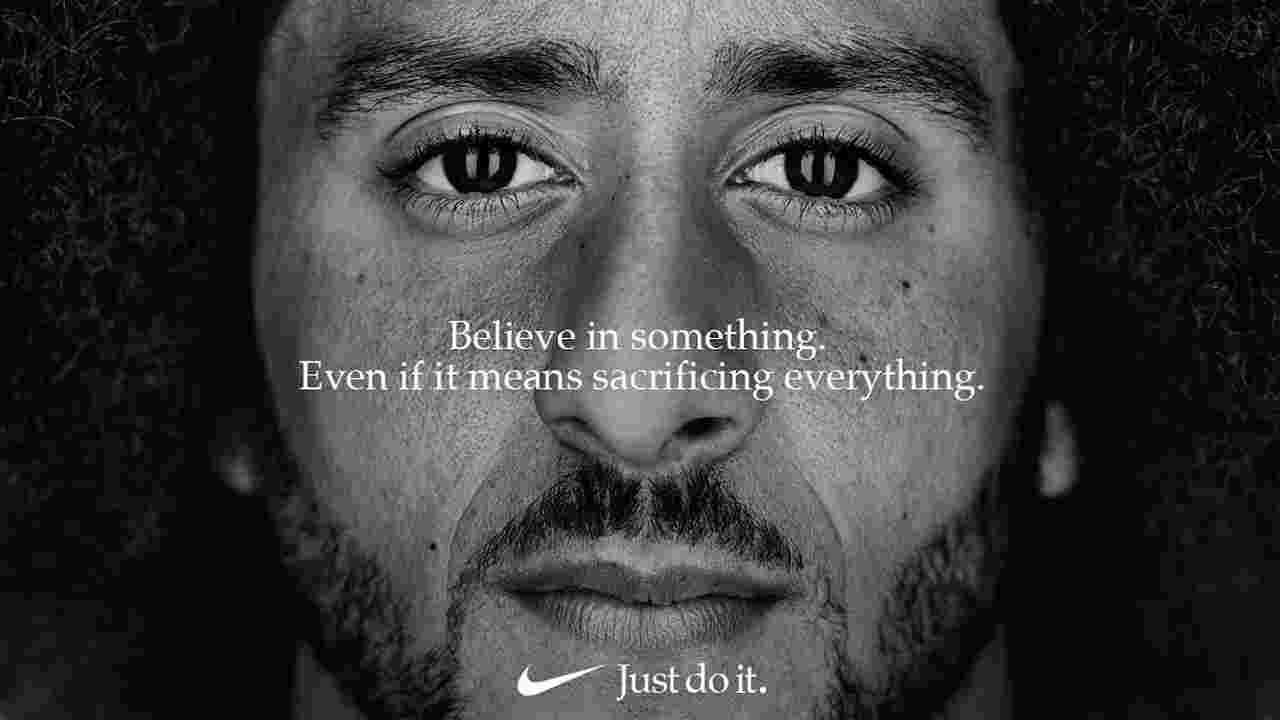
Splashed all over the news in recent weeks, Nike's bold, defiant stance in support of outcast American football player Colin Kaepernick is the perfect example of a brand adopting a political stance that's totally on-message.
It's not the first time Nike has been associated with a controversial sporting star – it also continued to run ads featuring Lance Armstrong after his doping scandal, Maria Sharapova following a failed drugs test, and Tiger Woods in the midst of his sex scandal and alleged drug-driving.
Making Kaepernick the face of a global campaign has proved the brand's most divisive move yet, however. Since his refusal to stand for the national anthem in 2016 – a protest against racial injustice and police brutality in the US, which drew the very public vitriol of President Trump – the former San Francisco 49ers star has been effectively exiled from the league.
Nike's inspired tagline 'Believe in something. Even if it means sacrificing everything' is a clear call to arms for standing passionately behind an issue, and its impact was swift. Protesters furiously destroyed their Nike-branded goods (prompting a witty reposte from the brand instructing people 'how to burn our products safely'), and its share price dropped – but support and admiration for the stance was just as strong.
Nike was brave enough to take a stand, and the short-term negative effect is offset by some truly savvy, long-term brand-building. One thing's for sure: no one will forget that campaign for a very long time.
02. Airbnb embraces refugees
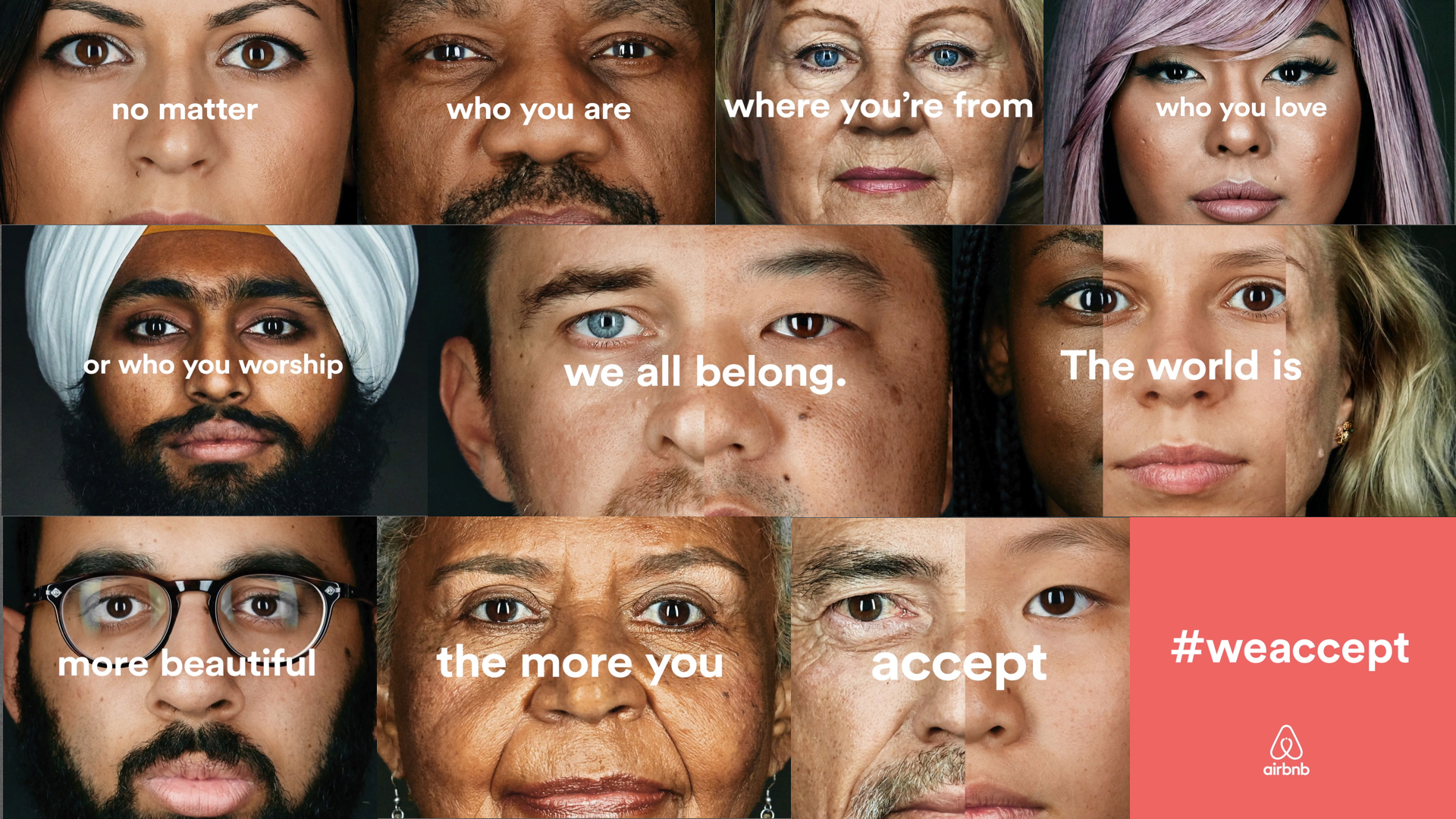
In another case of a brand seemingly baiting President Trump with a directly defiant stance, Airbnb launched its #WeAccept campaign at the 2017 Super Bowl, shortly after Trump announced his travel ban for citizens of particular countries.
Proudly championing all types of diversity, the campaign makes a powerful statement: "No matter who you are, where you're from, who you love, or who you worship, we all belong. The world is more beautiful the more you accept."
It's a simple, universal message – but the timing was everything. On the most public of stages – the Super Bowl – Airbnb effectively squared up to the President, without ever explicitly mentioning the policy.
The brand put its money where its mouth is, too, pledging to provide short-term housing for 100,000 people in need – including refugees, disaster survivors, relief workers and other displaced individuals – over the next five years. It's a stance that passionate Trump supporters are unlikely to be backing anytime soon, but it made a significant impact around the world.
03. Barnado's breaks the cycle of abuse
Sometimes a campaign's controversy comes more with the nature of the delivery, rather than the stance itself. BBH's 2008 multi-award-winning spot for Barnardo’s set out to raise awareness of child abuse, and break the destructive cycle – not a stance that many would challenge.
But the stark, brutal and depiction of domestic violence, drug abuse and crime attracted around 500 complaints – most of which focused on the distress and offence the ad caused, while others questioned the timing of the transmission. The ASA refused to ban the ad, arguing that the importance of its message merited the shock factor it delivered.
04. Equinox shrugs off breastfeeding taboos
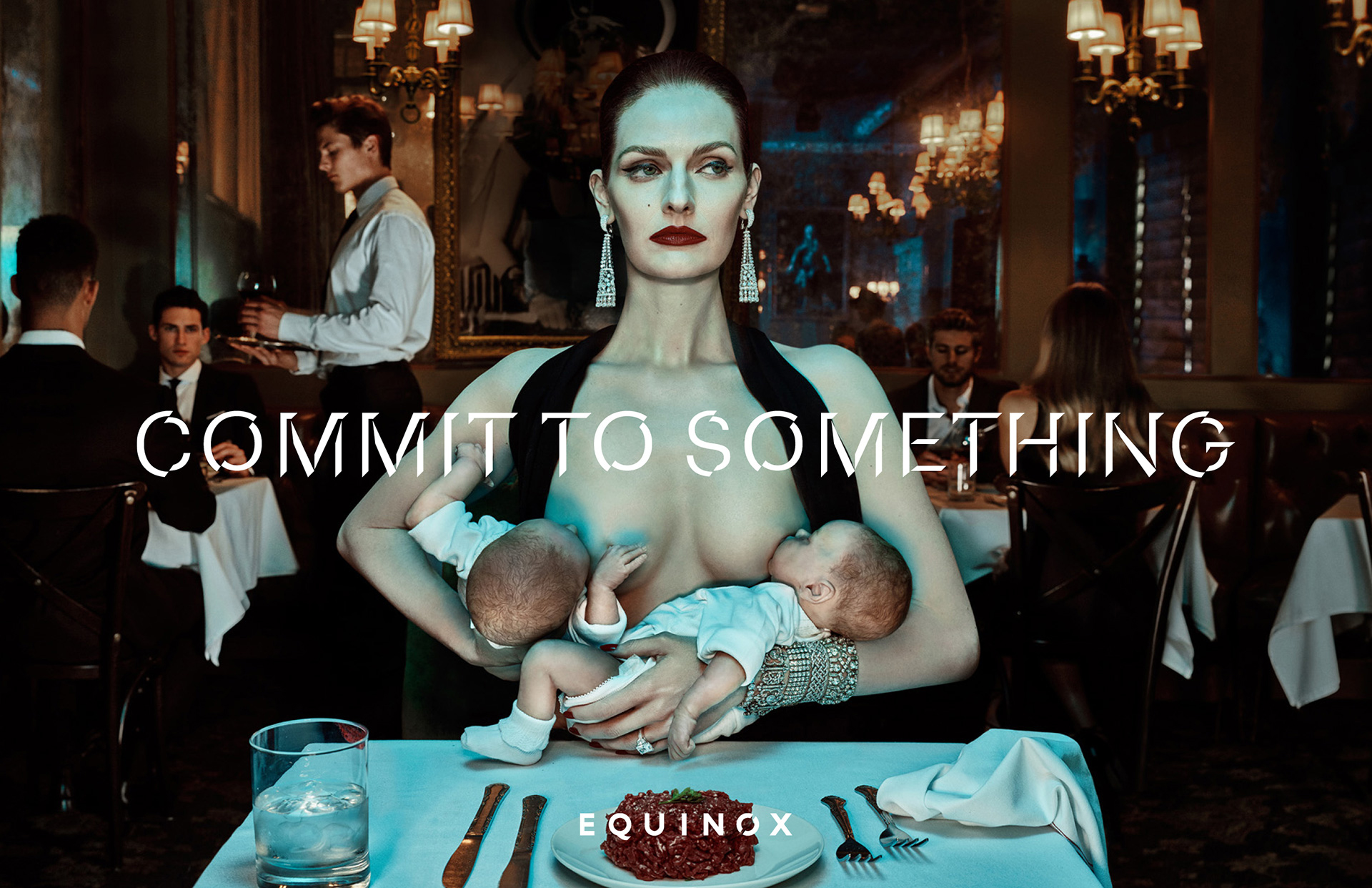
Sometimes a touch of controversy is needed to challenge a taboo that shouldn't be there in the first place. And the issue doesn't necessarily need to be relevant to that particular brand for it to be addressed.
In the case of Equinox Fitness, its 2016 campaign tagline – 'Commit to something' – had a broad range of potential applications, some more controversial or tongue-in-cheek than others. These includes joining a cult, making stacks of money, and collecting sexual partners. But the image that attracted the most attention was of model and heiress Lydia Hearst breastfeeding twins in an upmarket restaurant.
From the perspective of the campaign, these images are intended to convey commitment – a relatively abstract idea that theoretically applies as much to sticking with a gym membership as it does to breastfeeding in public. But of course, it was the image, not the campaign strategy, that sparked the debate.
It received comments in the thousands on Equinox's Facebook page – some applauding its unapologetic depiction of nursing, some critiquing its realism, others overtly disapproving of public breastfeeding in general. It may not have been the purpose of the campaign, but Equinox took a stance nonetheless.
05. McDonald's tackles childhood bereavement
There's really not much to say about this one. Childhood bereavement is a devastating, harrowing topic to broach by any standards – so using it as the context to flog a Filet-o-Fish was never going to go down well.
The ad featured a young boy struggling to find common ground with his recently deceased father. He finds it in the most unlikely place: a fondness for a certain fish sandwich. In the face of almost unanimous derision, McDonald's made a public apology and pulled the ad.
06. Benetton match-makes world leaders
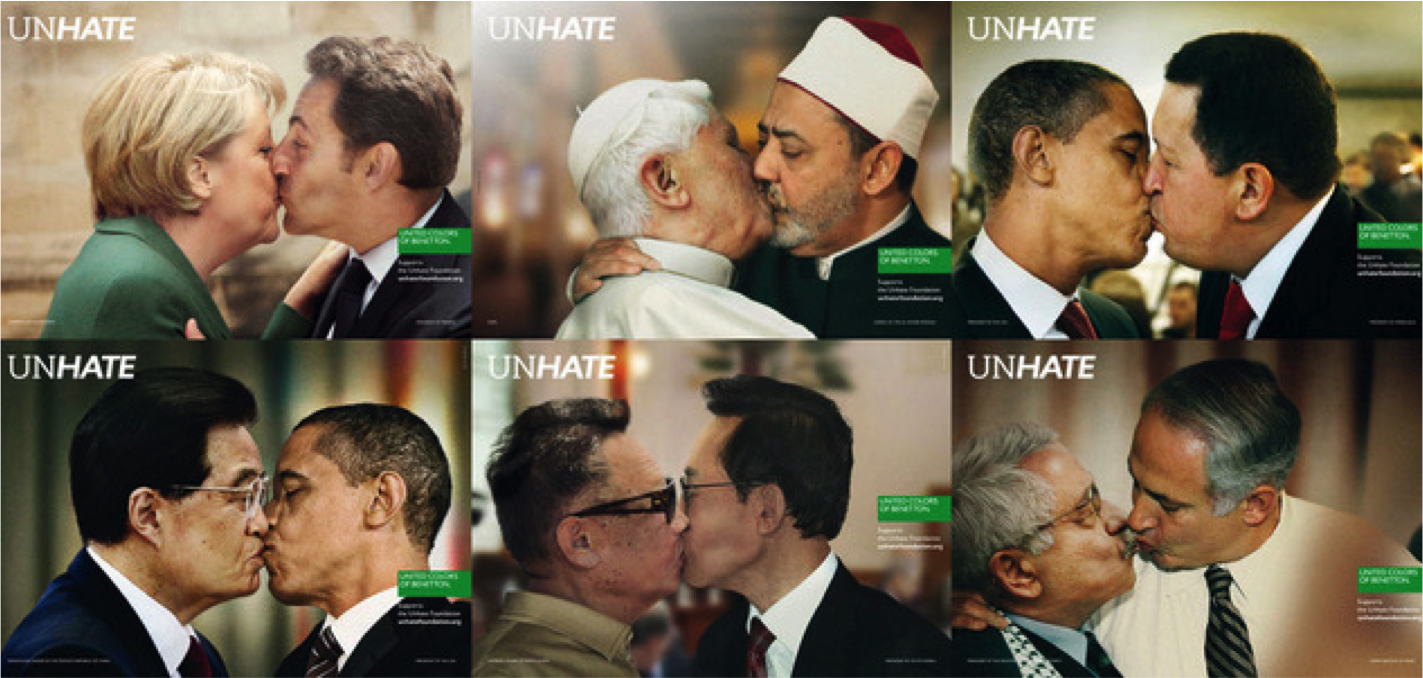
Benetton is well-known for its commendable, at times controversial attempts to champion the whole 'united colours' of humanity in its ads – becoming a tongue-in-cheek short-hand for ticking all the diversity boxes.
Its 2012 UnHate campaign caused a stir by digitally manipulating images of prominent world leaders to show them locking lips with an ideologically-opposed counterpart. These included China's Hu Jintao with Barack Obama, and Pope Benedict XVI with Egypt's Imam Ahmed el Tayyeb.
The message of setting hatred aside to find common ground is simple enough, but the delivery – particularly where leaders of countries with rather less liberal views on homosexuality were concerned – certainly ruffled some feathers around the world.
Brands must be wary, as sometimes in tackling one contentious topic head-on, a campaign can cross into another – and the notion of using homosexuality as a clear shock tactic also attracted its fair share of criticism.
07. American Apparel champions fair labour
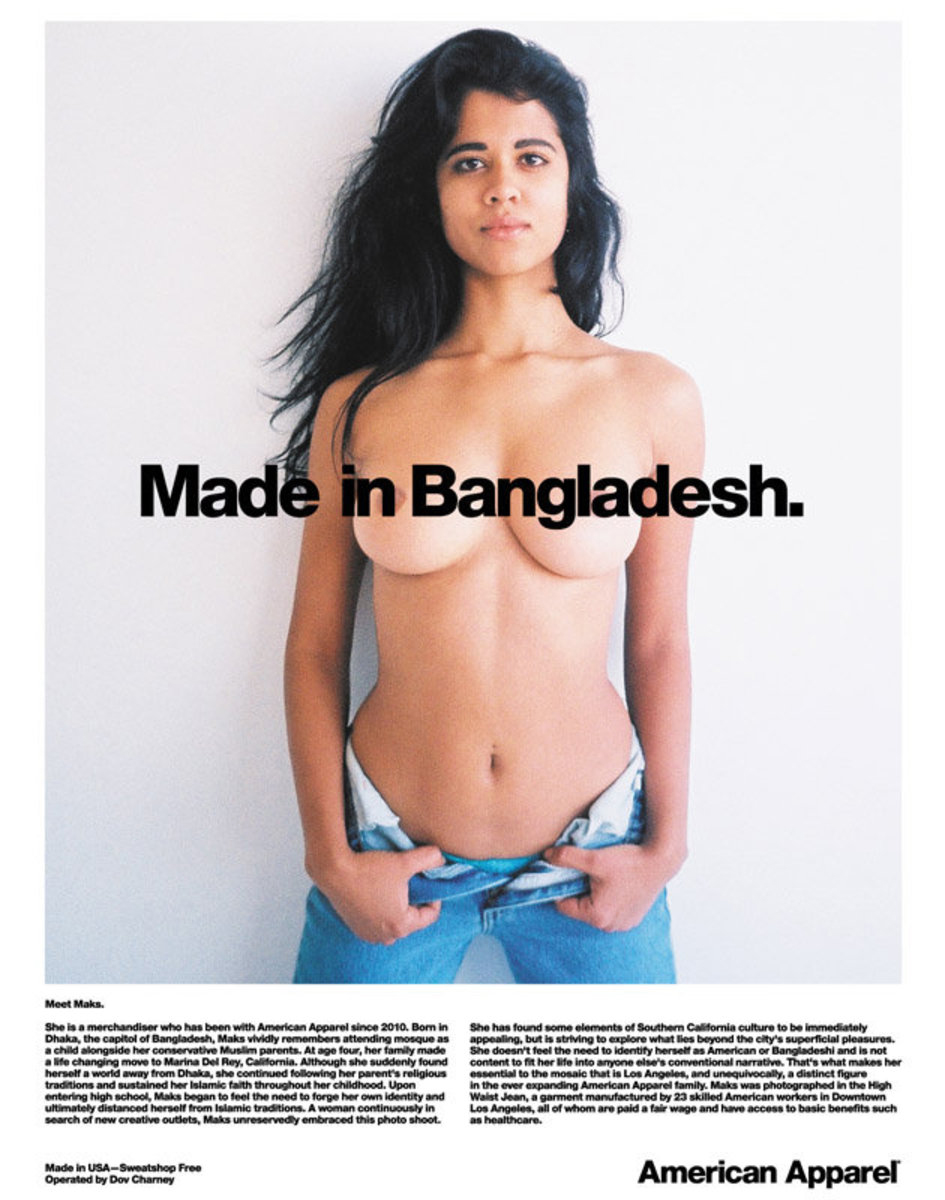
Maks had worked as a merchandiser at American Apparel for four years when she appeared in one of its brand – topless, and sporting an (unbuttoned) pair of the brand's high waist jeans.
According to the copy beneath, Maks "unreservedly embraced" the photoshoot and the empowerment it represented – she had moved as a young child from Bangladesh to California with her traditional Muslim family, but distanced herself from the faith as a teenager to forge her own identity.
Positioned across Maks' chest, the tagline 'Made in Bangladesh' clearly refers to her origins, which the copy explains in more detail, but it also makes a bold counter-statement about 'sweat shop' culture in the fashion industry in general, balanced by AA's 'Made in USA–Sweatshop Free' claim.
The ad attracted debate and controversy on multiple levels – Maks's being topless in an ad that discusses her devout Muslim background being one, another being the way in which American Apparel chooses to address the deeper, very real issue of sweatshops in Bangladesh by presenting an 'empowered', US-based woman, with her poor, underpaid, overworked counterparts staying invisible.
08. Pepsi jumps on an inappropriate bandwagon
We're ending with another catastrophic failure to engage with a thorny topic, which. like McDonald's, was met with almost universal criticism. But while McDonald's error was of totally inappropriate context, Pepsi made a much more cynical, overt attempt to apply corporate gloss to deep-rooted political issues.
Against the backdrop of hugely turbulent period of protests, from the Black Lives Matter movement to anti-Trump marches and more, Pepsi's ad, fronted by Kendall Jenner, was heavy-handed and trite – and the backlash was swift.
Handing a Pepsi to a riot gear-clad cop to diffuse a pretty anodyne, commercialised ‘protest’ is far too literal a metaphor, and as industry commentators reported in unison at the time, is spectacularly tone-deaf in terms of how the brand tried to position itself as a catalyst for unity and harmony. The ad was duly pulled.
All the above examples show that taking a firm standpoint on a contentious issue can attract lovers and haters in equal measure. Sometimes addressing the issue alone can ruffle feathers, particularly if shock tactics are employed. However, if the sentiment comes from the right place, and is expressed coherently, it can give a brand both substance and authority. Miss the mark, and the burn can be deep.
Related articles:
- 7 logos we all love to hate (and lessons we can learn)
- 9 lessons from the world's top viral images
- 5 times brands shook up their logo for a powerful message
Contributer : Creative Bloq
 Reviewed by mimisabreena
on
Monday, October 08, 2018
Rating:
Reviewed by mimisabreena
on
Monday, October 08, 2018
Rating:
















No comments:
Post a Comment